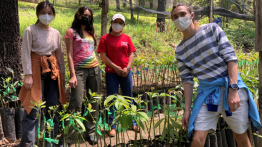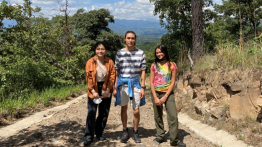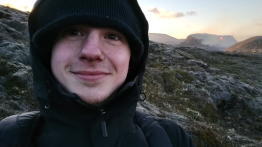2021 Summer Study Abroad: Guatemala, Iceland, Spain, and Singapore
POSTED ON: September 15, 2021
Each summer, the Albert Nerken School of Engineering offers a 6–8-week study abroad experience to students in their second or third year at Cooper. This summer, six students participated in our summer study abroad programs in Guatemala, Iceland, Spain, and a virtual program in Singapore.
Associate Dean for Educational Innovation, Lisa A. Shay notes, “Cooper’s summer abroad experience supports the Albert Nerken School of Engineering’s Strategic Goals of educational excellence, diversity and inclusion, and impactful engagement. And this year, many of the student projects also aligned with Peter Cooper’s progressive vision of education to make society more just. The summer abroad program provides students a unique opportunity to not only hone their engineering skills but also to learn an incredible amount about themselves.”
The Albert Nerken School of Engineering is grateful to the Victor and Eleanor DiFranco Endowed Fund and the E. Durbin & J. Morris Innovation Fund for underwriting the Dean’s Office Summer Abroad Cultural Immersion Fellowships.
| GUATEMALA | ICELAND | SPAIN | SINGAPORE |
Undergraduate engineering students Seena Seon ChE’23, Brandon Bunt BSE’22, and Joya Debi EE’23 completed the first-ever 6-week study abroad experience at the Barbara Ford Peacebuilding Center in Guatemala. Dean Shay accompanied the students on their first week in Guatemala, as she helped develop the summer study abroad experience in Guatemala in cooperation with Sister Virginia Searing, President of the Board of Directors of the Barbara Ford Peacebuilding Center Association, and two of the Center’s senior staff members, Marta Leticia Garcia Ajucum, Executive Director, and Luciano Laynez Perez, Director of Finances and Administration.
In Guatemala, Joya worked on lowering energy costs at the Center by introducing solar energy. She analyzed electricity costs and measured the amount of available solar insolation needed to identify optimal panel sizing. Joya also worked on exploring various energy and water storage systems to provide solutions when electricity and water is down in Guatemala.
Brandon and Seena worked together to turn organic waste into biochar, a type of charcoal that can aid to restore degraded soils, enhance plant growth, and provide water filtration. The two also worked on analyzing the amount of organic waste produced by an onsite restaurant and Centro-Integral de Produccion y Capacitacion Agroambiental (CIPCA), a model farm on the Center property.
As the first group of Cooper students to travel to Guatemala, they were initially a bit uncomfortable journeying into uncharted territory. Later they realized this was a benefit in the engineering design process; they did not have pre-conceived ideas about what the client needed. As Brandon relates, “Going in blind meant we had to listen to the Barbara Ford Center staff, interview local farmers, travel with the sisters to nearby towns, and explore the city of Santa Cruz del Quiche ourselves simply to understand what life was like for the average person who lived in Santa Cruz del Quiche or worked at the Barbara Ford Center.” Joya adds, “My time in Guatemala has taught me so much, but most importantly it has taught me to be more aware of myself, my thoughts, and my surroundings.” Seena concurs, “Going to Guatemala was a
life-changing experience.”
You can read more of our students’ experiences featured on the Sisters of Charity website.
Rising civil engineering sophomore, Edward “Eddie” Zlotskiy, participated in our study abroad research program at Reykjavik University in Reykjavik, Iceland.
During his 6-weeks abroad, Eddie participated in the university’s Research unit under the Department of Engineering where he worked on researching the physical characteristics of microplastics and how its material affects atmospheric transport through emission, air, and water cycle.
Outside of research, Eddie met many new friends, explored the city, and even enjoyed sightseeing near the Fagradalsfjall Volcano. “Travelling abroad to work with another university was an eye-opening experience,” Eddie shares. “My studies weren't just about learning and research; I met many new friends who were also international students and I got to know most of them dearly. I left this experience with special memories, and I hope to give back to the world just as much with my research,” Eddie adds.
Rising electrical engineering junior, Daniel Tsarev, participated in a 6-week study abroad research with Dr. Jose Maria Camara Nebreda, Vicerrector de Personal Docente e Investigador and Professor at the Universidad de Burgos in Spain. In Spain, Daniel embarked on a research project to design and implement an automated framework for testing, accumulating data, and analyzing data from redox flow battery experiments. The final framework required little computational power, displayed data in real time, and stored the data on local and cloud storage. The framework has the potential to scale and remotely control the redox flow
battery, through oxygen rebalancing mechanisms and changing flow rates.
Daniel sums up his experience, “I am extremely grateful for having the opportunity to participate in the study abroad program offered. I have learned so much about not just Spain and its long and complicated culture and history but also about how to live in a foreign country on my own. I had the opportunity to be exposed to cultures from all over the world and about what career path I want to take. This experience was extremely enlightening, and I would encourage other students to participate in it.”
Min Cheng, rising electrical engineering senior, was our first student to participate in the Summer Engineering Research Internship for U.S. Students (SERIUS) program at the National University of Singapore. This 8-week summer program would ordinarily be held in Singapore, but this year was held virtually due to the COVID-19 pandemic.
“The study abroad experience is really inspiring to me. The professor I was working with had a clear step-by-step envision and expectations of the tasks assigned to me and the entire research. We had a steady meeting schedule every weekday which I think was very helpful for our communication during this remote period. Besides the patient and careful guiding of the professor, I also felt so much honor to work in and explore this cutting-edge neuroscience/bioengineering research about Hippocampus, which gives me a lot of insights working in the related medical data processing position in my future career. It also gives me a lot of confidence and interest to dive in the intersection research between EE and Bioengineering in the future.” Min shares.
Interested in studying abroad? Visit our study abroad website for more information.







